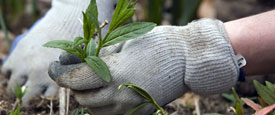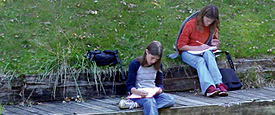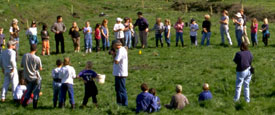Smart by Nature is based on four guiding principles: Nature is our teacher; Sustainability is a community practice; The real world is the optimal learning environment; Sustainable living is rooted in a deep knowledge of place.
Nature is our teacher
To envision sustainable communities, we look to design principles evolved since the advent of life on Earth. We can pattern human societies and institutions after the patterns found in sustainable ecosystems. We can learn from traditional and indigenous societies that have thrived for centuries following these same patterns. Accepting nature as our teacher helps educators focus on basic ecological principles, think from the perspective of systems, practice solving for pattern, and support.Sustainability is a community practice
The sustainability of a community depends on the health and inclusiveness of the network of relationships within it. Successful schools act as "apprentice communities" for learning the art of living in an interdependent world. Schools also teach by how they act in the world, use resources, and relate to the larger communities of which they are a part.The real world is the optimal learning environment
Sustainability is best learned in the real world. Students experience nature's patterns and processes as they occur. They become engaged in activities that matter and participate with people where they live and work. They observe and try out skills needed by change agents, and discover that their contributions can make a difference. School buildings and campuses provide opportunities to explore and demonstrate sustainable practices in action.Sustainable living is rooted in a deep knowledge of place
Places known and loved deeply have the best chance to be protected and preserved, so that they will be cherished and cared for by future generations. Studying a place in depth helps create a sense of kinship. It allows students to see through the eyes of the people who call that place home. It helps them imagine and contribute to locally based solutions to problems.The schooling for sustainability movement recognizes that young people in school today will inherit a host of pressing (and often escalating) issues.



























